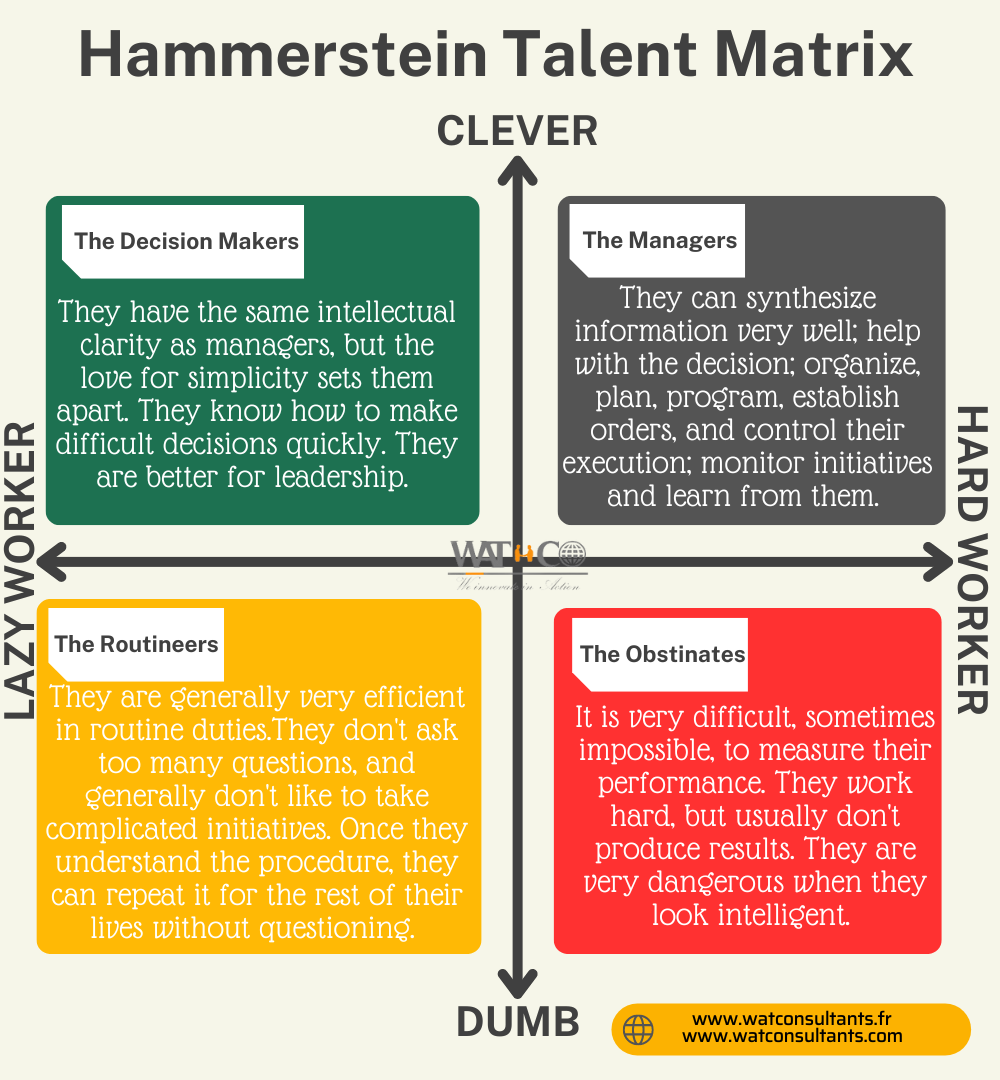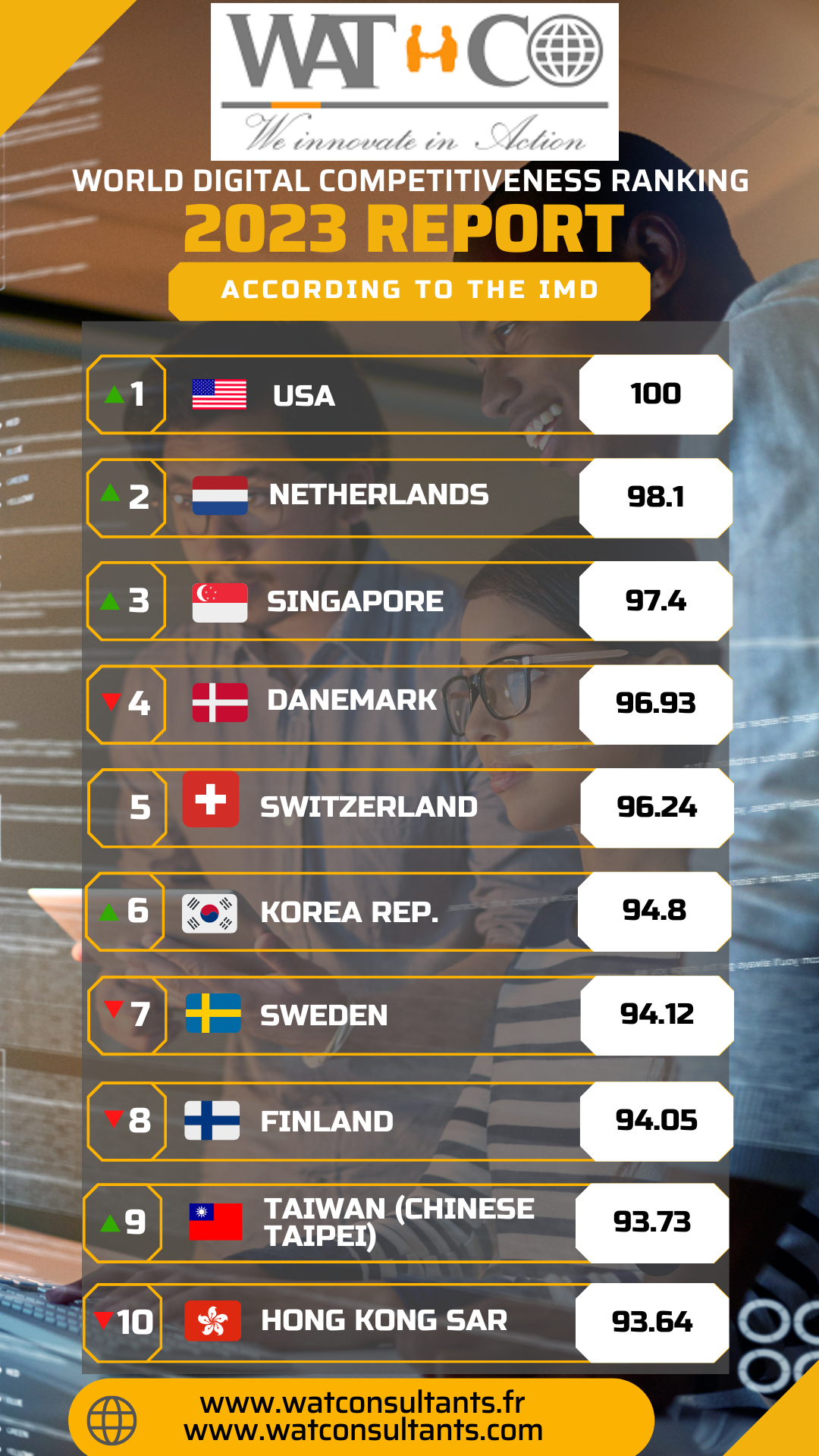
HAMMERSTEIN TALENT MATRIX
Being an operational consulting firm, we draw inspiration from the best in operational management. We therefore believe that it is useful to study the use of military staff and the way in which staff officers work. Perhaps the best historical insight into the different qualities of staff officers and commanders comes from General Kurt von Hammerstein, Commander-in-Chief of the Reichswehr from 1930 to 1934.1 He said:
I distinguish four types. There are clever, hardworking, stupid, and lazy officers. Usually two characteristics are combined. Some are clever and hardworking; their place is the General Staff. The next ones are stupid and lazy; they make up 90 percent of every army and are suited to routine duties. Anyone who is both clever and lazy is qualified for the highest leadership duties, because he possesses the mental clarity and strength of nerve necessary for difficult decisions. One must beware of anyone who is both stupid and hardworking; he must not be entrusted with any responsibility because he will always only cause damage.''2
At WAT&CO Cameroon , we took inspiration from General Kurt von Hammerstein , and developed what we call: the #Hammerstein #talent matrix . The purpose of this #matrix is to classify the human resources we have. Hammerstein's talent matrix is based on a cross between: #clever and #dumb on one side and #hardworking and #lazy on the other.
We therefore ultimately have 4 categories of talent:
- The first Category is that of dumb and lazy talents: The Routineers
They are generally very efficient in routine duties. Even if they do the same task every day for 40 years, they will become rather more efficient at those tasks and over time will not want to do anything else. They don't ask too many questions, and generally don't like to take complicated initiatives. Once they understand the procedure, they can repeat it for the rest of their lives without questioning. Here we find security agents, certain front office staff (such as counter agent), industrial systems operators, etc.
Routineers appreciate the stability and predictability that comes from repeating the same processes regularly. Since all jobs involve some repetition, this is a good thing for them, unless the candidate loses concentration and performs poorly or engages in unsafe behavior due to a lack of awareness attention or excessive familiarity.
People in this category like to focus on performing a repetitive task as accurately as possible every time.
- The second Category is that of clever and hardworking talents: Managers
They can synthesize information very well; help with the decision; organize, plan, program, establish orders, and control their execution; monitor initiatives and learn from them. They easily assume positions of responsibility.
They are not afraid of tedious and repetitive tasks and like to have fun completing the task more quickly or increasing output, time passes more quickly.
They are useful and effective in finding solutions. They work hard and produce very good results. But they are not effective in decision-making. Talented in complexity and accustomed to problems, managers love both the journey and the final solution. They are good supervisors. There we find engineers, teachers, doctors, managers, certain back office staff (such as marketers), accountants, HR, etc.
- The third Category is that of clever and lazy talents: The Decision Makers
They have the same intellectual clarity as managers, but the love for simplicity sets them apart. They know how to make difficult decisions quickly. They are better for leadership because they never make it complicated when you can make it simple. Unlike managers, they have sharper mental lucidity and more solid strength of character. Faced with each difficulty, they not only look for a solution, but above all, they look for how to no longer have to face this type of problem. They don't like routine tasks, which pushes them to find innovative solutions. With time and good training, a manager can end up being a decision-maker. However, there are some, and they are rare, these talents who are born decision-makers. HR doesn't like the latter, because they often resign very quickly and give a lot of trouble. They are less docile than managers, and prefer the final solution to the journey. Most often, their specialty was acquired self-taught or innately.
- The fourth Category is that of dumb and hardworking talents: The Obstinates
It is very difficult, sometimes impossible, to measure their performance. They work hard, but usually don't produce results. They are very dangerous when they look clever. These are talents that all companies should avoid. But when they learn to become intelligent, they directly enter the category of Managers (After a lot of mistakes and damage).
Because they are hardworking, it is generally difficult to part with them, however, they cause more harm than good to the company. The love for work generally makes them stubborn in certain tasks. When a manager becomes prideful, he also falls into this category.
Which category do you think you fall into?
You can contact us for details of the questionnaire which allows us to determine the category of a talent.
- “Kurt Freiherr Von Hammerstein- Equord ,” Gedenkstätte Deutscher Widerstand ( German Resistance Memorial Center), accessed June 11, 2024 , https://www.gdw-berlin.de/en/recess/biographies/index_of_persons/biographie/view-bio/kurt-freiherr-von-hammerstein-equord/?no_cache=1 .
- Horst Poller, Conquered Past: The 20th Century, Witnessed, Endured, Shaped (Munich: Olzog Verlag, 2010), 140.




